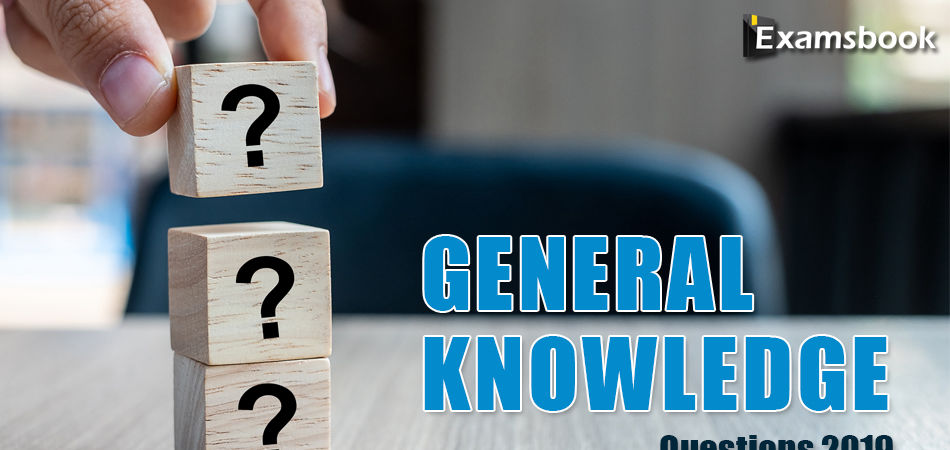Important General Knowledge Questions 2020

GK or General Knowledge section can be the easiest section in all government and competitive exams when followed regularly. Aspirants of competitive exams such as RPSC, UPSC, SSC, Bank, Railway, etc can refer to the general knowledge questions and answers from this article. This article will help you in cracking any competitive exams.
Here, I am providing the Important General Knowledge Questions for those learners who are preparing for SSC and other Competitive Exams. In this post, I have updated the most important questions answers around the Daily GK with the latest General Knowledge Questions and Answers about many topics covered.
Quizzes: General Knowledge Mock Tests
Important General Knowledge Questions 2019
Q : Name the first country which adopted Preamble for its written constitution?
(A) USA
(B) India
(C) Britain
(D) Canada
Correct Answer : A
Explanation :
The correct answer is the USA. The practice of a written constitution began in early colonial America.
Under which Article Jammu and Kashmir had been given special status by the Indian Constitution?
(A) 364
(B) 368
(C) 370
(D) 377
Correct Answer : C
Explanation :
Article 370 embodied six special provisions for Jammu and Kashmir: It exempted the State from the complete applicability of the Constitution of India. The State was conferred the power to have its own constitution.
Who presides over the joint session of the Indian Parliament?
(A) Speaker of Lok Sabha
(B) President of India
(C) Chairman of Rajya Sabha
(D) Senior Member of Parliament
Correct Answer : A
Explanation :
According to Article 108 of the Indian Constitution, the joint session of the Parliament is presided over by the Speaker of the Lok Sabha.
Which article of Indian constitution is Dr. B.R. Ambedkar called "The heart and soul of the Indian Constitution"?
(A) Article 14
(B) Article 19
(C) Article 356
(D) Article 32
Correct Answer : D
Explanation :
The father of the Indian Constitution, Dr. B.R. Ambedkar had declared Article 32 as the “heart and soul of the Indian Constitution.
Franchising is
(A) not having to pay any fee
(B) a form of licensing
(C) Operating a business without a license
(D) Operating with less control
Correct Answer : B
The system of judicial review in in Indian constitution adopted from
(A) India
(B) Gemany
(C) U.K.
(D) U.S.A
Correct Answer : D
Explanation :
The Indian Constitution has adopted judicial review from the US Constitution.
The Constitution of India was adopted by the Constituent Assembly on-
(A) 26 January, 1950
(B) 26 January, 1949
(C) 26 November, 1949
(D) None
Correct Answer : C
Explanation :
16 July 1948: Harendra Kumar Mukherjee V.T. Krishnamachari was elected the second vice-president of the Constituent Assembly. 26 November 1949: The Constituent Assembly accepted the Indian Constitution and some of its sections were also implemented.
The proclamation of emergency must be approved by both the houses of parliament within _____ after the proclamation.
(A) 1 year
(B) 6 months
(C) 3 months
(D) 1 month
Correct Answer : C
Explanation :
The proclamation of national emergency must be approved by both the Houses of Parliament within three months from the date of its coming into force.
Between whom was the Poona Pact held?
(A) Nehru and Ambedhkar
(B) Gandhi and Ambedhkar
(C) Malvai and Ambedhkar
(D) Gandhi and Ambedhkar
Correct Answer : B
Explanation :
With the efforts of leaders like Rajagopalachari, Jayakar, Tej Bahadur Sapru, Ghanshyam Das Birla etc., an agreement was signed between Mahatma Gandhi and Dalit leader Ambedkar on 24 September 1932 AD. This agreement is known in history as 'Poona Agreement'.
The division of powers and independent judiciary are two important characteristics of
(A) Socialist form of government
(B) Unitary form of government
(C) Democratic form of government
(D) Federal form of government
Correct Answer : C
Explanation :
The division of powers and independent judiciary are two important characteristics of a democratic system of government.



